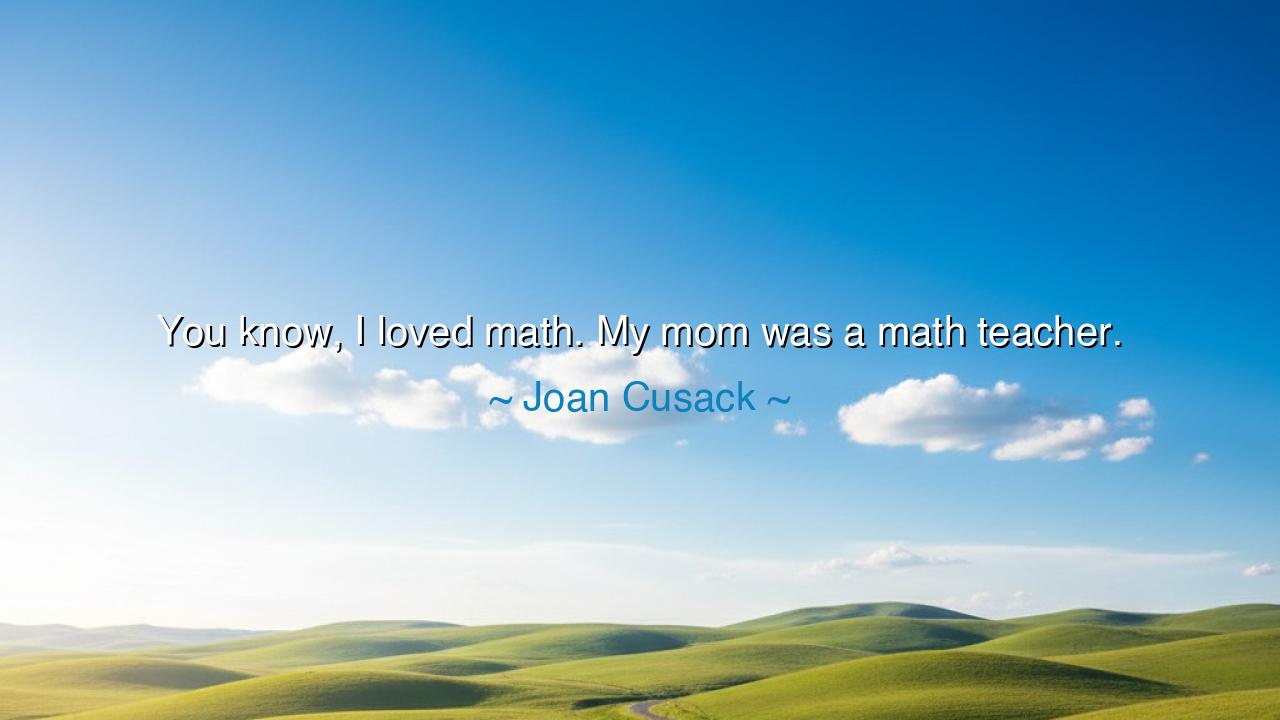
You know, I loved math. My mom was a math teacher.






The words of Joan Cusack, “You know, I loved math. My mom was a math teacher,” are spoken with a simplicity that hides a profound truth about inheritance, influence, and the shaping of the human mind. In them, she acknowledges that her love for mathematics was not born in isolation, but was nurtured in the home, passed down through the steady presence of her mother. It is not only knowledge that a teacher imparts, but also affection for the subject, a sense of wonder in its patterns, and reverence for its logic. For the child, this love becomes a seed, planted by the example of the parent, watered daily by their words and presence.
The origin of this statement lies in the timeless reality that children often draw their first passions from their parents. A mother who is a math teacher does more than instruct others—she embodies numbers, equations, and problem-solving as part of daily life. For Cusack, this must have created an atmosphere where math was not a distant, abstract subject in a textbook, but a living practice, woven into the rhythms of her upbringing. Thus, her words point us to the sacred role of parents: they are not only guardians of the body, but cultivators of the mind.
This truth is reflected in history. Think of Hypatia of Alexandria, taught by her father, Theon, in philosophy and mathematics. Under his guidance, she grew into one of the most renowned mathematicians and thinkers of her time. What began as a father’s instruction became a legacy for the world. In the same way, Cusack’s affection for math, inspired by her mother, reminds us that the passions of one generation can spark the brilliance of the next. Such bonds between parent and child shape destinies and leave imprints far beyond what the parent may imagine.
But her words also carry a tone of love—“I loved math.” Notice that she does not speak of duty or mere competence, but of joy. To love a subject is to see its beauty, to find harmony in its structures, and to delight in its order. Such love rarely springs from force; it comes instead from guidance that makes learning luminous, that turns struggle into play, and that draws out wonder. This is the mark of a great teacher, and in Cusack’s memory, her mother embodied it.
At the same time, Cusack’s remark holds a subtle lesson about the hidden influences in every life. Though she became an actress, known for her wit and presence on screen, she carries within her the love for mathematics instilled in childhood. This shows us that even if a passion does not become a career, it shapes the mind in enduring ways. The precision of math, the discipline of logic, the creativity of problem-solving—these qualities may have guided her art, her timing, her choices. No knowledge is wasted when it is rooted in love.
The lesson is clear: parents and teachers hold immense power in shaping the passions of the young. A child will not remember every formula or every rule, but they will remember whether their parent or teacher taught with love. If we wish to inspire lasting curiosity, we must not only instruct but also embody joy in the subjects we pass down. What begins as the parent’s passion may become the child’s lifelong strength.
Practically, this means we must nurture learning environments in our homes and communities where subjects are not feared but loved. Parents can share their own interests openly, letting children “catch” enthusiasm the way one catches fire from a flame. Teachers must remember that their influence extends beyond the classroom, shaping not only skills but hearts. And children, when they grow, should honor these inheritances, as Cusack does, by acknowledging the gifts of their mentors.
Thus, Joan Cusack’s simple words become a teaching for the ages: that love for knowledge is a legacy, passed down through presence, example, and joy. Her mother taught math, but more than that, she taught how to love math—and that love became part of her daughter’s story, a reminder to us all that the most enduring gift one can pass on is not only skill, but delight in the beauty of learning.






AAdministratorAdministrator
Welcome, honored guests. Please leave a comment, we will respond soon